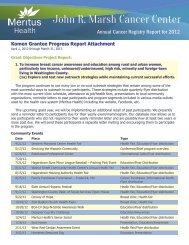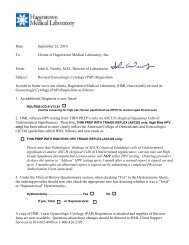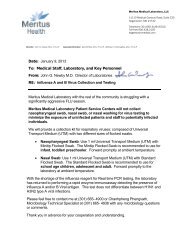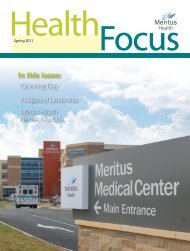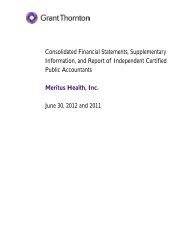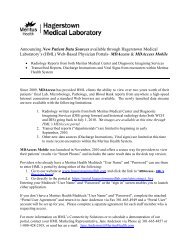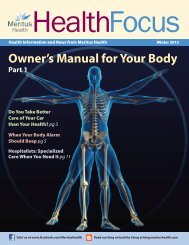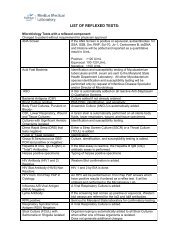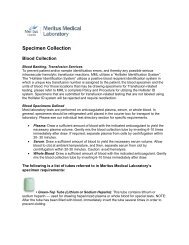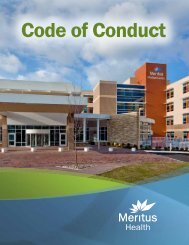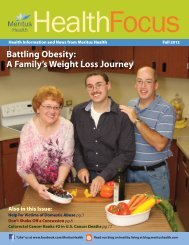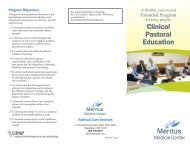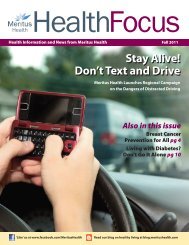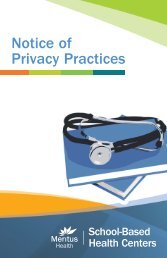Winter 2013 - Meritus Health
Winter 2013 - Meritus Health
Winter 2013 - Meritus Health
Create successful ePaper yourself
Turn your PDF publications into a flip-book with our unique Google optimized e-Paper software.
Fast Action Required for Stroke:CALL 911 F.A.S.TIf you think someone is having astroke, act F.A.S.T.FASTFACE:Ask the person to smile.Does one side of theface droop?ARMS:Ask the person to raiseboth arms. Does onearm drift downward?SPEECH:Ask the person to repeata simple sentence. Arethe words slurred?TIME:If the person showsany of these symptoms,call 911Stroke occurs when a blockage or burst blood vessel interrupts bloodflow to the brain.Within minutes, brain cells begin to die because theylack oxygen and nutrients. Stroke victims need to get to the hospitalimmediately by EMS transport to be evaluated and treated. The clot-bustingdrug tissue plasminogen activator or tPA is appropriate for some strokepatients, but must be given within three hours from the start ofstroke symptoms.Sudden onset is a telltale sign of stroke.If someone you know suddenly has trouble walking (loss of balance),seeing (blurred or blackened vision in one or both eyes) or speaking(slurred speech, inability to speak or confusion), call 911 right away.Other signs of stroke include weakness on one side of the body and anunexplained sudden and severe headache.Lower your risk.Most people, as they age, begin to have risk factors for stroke, especially highblood pressure and high cholesterol. Unhealthy lifestyle habits, particularlysmoking and poorly-controlled diabetes or high blood pressure, acceleratethe blood vessel damage that contributes to stroke. Even if you look goodand feel good, work with your healthcare provider to manage modifiablerisk factors including:• High blood pressure• High cholesterol• Overweight/obesity• Sedentary lifestyle• Diabetes• Smoking/Nicotine use• Alcohol abuse or illicit drug use• Heart disease• Atrial fibrillation (irregular heartbeat)• Estrogen or birth control pill use,especially in combination withsmokingDeciding Where to Go for Immediate CareUrgent and emergency care—they sound, well thesame. But when you are sick, knowing the differencebetween emergency and urgent care can spare you alot of anxiety.Emergency departments are designed for people with lifethreateningconditions—like heart attacks, strokes, severeburns, near-amputated limbs, head injuries and acute allergicreactions. The hospital setting provides immediate access tospecialized medical personnel, operating rooms, a blood bank,ventilators and countless medications.But sometimes that level of care is not needed. Earaches,nosebleeds, sprains and strains can be treated by theknowledgeable and caring medical professionals at <strong>Meritus</strong><strong>Health</strong>’s two Urgent Care locations. Our board-certifiedphysicians, nurse practitioners and physician assistantsprovide comprehensive care during extended hours, with noappointment necessary, seven days a week.Medical emergencies require the resources and servicesonly a hospital can provide, but when you are everyday-sickor have a minor injury, our Urgent Care centers can get youback on your feet.Quick Reference—Urgent Care vs. Emergency DepartmentMedical Condition Urgent EmergencyCare DepartmentCoughing and sore throatSeizures and convulsionsDrug overdoseUpper respiratory tract infectionLoss of consciousnessSmall bone fractures (toe or finger)Abdominal pain during pregnancyDifficulty breathingVomiting, diarrhea andstomachachesSudden numbness or weaknessin the face, arm or legSkin rashFever or fluXXXXXXXXXXXX<strong>Meritus</strong><strong>Health</strong>.com 5



